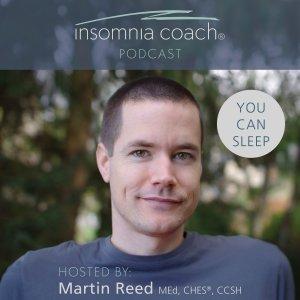Insomnia Coach® Podcast

How Cindy tackled the insomnia that appeared after her baby was born by accepting nighttime wakefulness and eliminating safety behaviors (#31)
Listen to the podcast episode (audio only)
Cindy developed postpartum depression shortly after her daughter was born and was prescribed medication to help her sleep. The medication seemed to work at first but Cindy soon found that it wasn't helping and this led to more anxiety and more sleep difficulties.
Cindy thought that her brain was broken and started to implement lots of different safety behaviors in a bid to get her sleep back on track. After trying to eliminate all the possible causes of her insomnia, Cindy was continuing to find sleep difficult.
Fortunately, Cindy realized that it was all the effort she was putting into sleep and all the behaviors she was implementing in a bid to protect her sleep and create perfect conditions for sleep that were keeping her insomnia alive.
Cindy started to accept the possibility of nighttime wakefulness and the reality of nighttime wakefulness when it occurred. She took steps to make nighttime wakefulness more pleasant and took comfort in the fact that nights of less sleep build sleep drive and increase the likelihood of sleep on subsequent nights.
Ultimately, Cindy stopped putting pressure on herself to sleep. She stopped striving for sleep, she stopped putting effort into sleep, she stopped trying to fight or avoid sleep-related anxiety, and she started to recognize that all the anxious thoughts produced by her brain were just that — thoughts. Nothing more and nothing less.
Today, Cindy doesn't take any sleep medication and she is sleeping well. Perhaps one of the biggest insights she shared is that she no longer uses sleep itself as a measure of her success. In Cindy's words, it's our relationship with sleep that is the true measure of success.
Click here for a full transcript of this episode.Click here to hide the transcript.
Martin Reed:
Welcome to the Insomnia Coach Podcast. My name is Martin Reed. I believe that nobody needs to live with chronic insomnia and that evidence-based cognitive and behavioral techniques can help you enjoy better sleep for the rest of your life.
Martin Reed:
The content of this podcast is provided for informational and educational purposes only. It is not medical advice and is not intended to diagnose, treat, cure, or prevent any disease, disorder, or medical condition. It should never replace any advice given to you by your physician or any other licensed healthcare provider. Insomnia Coach LLC offers coaching services only and does not provide therapy, counseling, medical advice, or medical treatment. The statements and opinions expressed by guests are their own and are not necessarily endorsed by Insomnia Coach LLC. All content is provided "as is" and without warranties, either express or implied.
Martin Reed:
Hi, Cindy. Thank you so much for taking the time out of your day to come onto the podcast.
Cindy Xia:
You're welcome. Thanks for having me here.
Martin Reed:
It is great to have you on. I'm really excited for everything that we're going to be talking about. Let's start at the beginning. Can you just tell us a little bit about when your sleep problems first began, and what you feel caused those initial issues with sleep?
Cindy Xia:
So it started when I had Feena in October last year. And I had a great pregnancy, a great birth. I felt really good. Feena was actually a pretty good baby. And for the first few days I was actually still doing okay. I was really sleep deprived from looking after her, but I had no problems just passing out whenever I had the chance. And then around a couple of days in, I just remembered feeling really off, really jittery and just feeling like I couldn't switch off. And now I think back, it was sort of probably the beginning of my postpartum ...






 Visit Podcast Website
Visit Podcast Website RSS Podcast Feed
RSS Podcast Feed Subscribe
Subscribe
 Add to MyCast
Add to MyCast